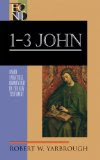You just have to love a commentary which opens with a preface like the one in Bob Yarbrough’s 1, 2, and 3 John (Baker Exegetical Commentary on the New Testament).Now, I was already a Yarbrough fan having had him for German while at TEDS and enjoyed several interactions with him.Therefore, what he wrote in this preface did not surprise me, but left me with a smile thinking, “Vintage Yarbrough!”
This preface is worth reading in its entirety, but I will post some excerpts here as good examples of the approach to biblical study.
“It is customary for commentary writers to muse aloud to try to justify yet another painstaking study of biblical books that have already been treaded repeatedly.Nearly one hundred commentaries were written on the Johannine Epistles from patristic times to the early 1980’s…. I offer no defense for this commentary if the requirement is earthshaking novelty, unprecedented profundity, or unrivaled comprehensiveness.Life is not long enough to do justice to even epistle-length snippets of Christian Scripture, and publishers are not going to wait a lifetime for the manuscript anyway. . . . What I have written is limited in scope, incomplete in breadth, and restricted in insight. . . Experts should prepare to encounter any number of limitations, serious even if not criminal, in the present work.
Since a commentary is supposed to be explication rather than creative or even historical fiction, its redeeming value, if any, will lie in communication of any truths observed and articulated.Here I may express more optimism, for even a modest witness to gospel verities carries divine promise. . . . Like the exegetical labors of many interpreters through the ages, my work on the biblical text has grown out of a sense of conviction of sin, seizure by divine grace, and fascination with biblical wisdom as I sometimes think I understand it.” (ix)
“While academic protocol moves perhaps most commentators to take their primary discussion partners from among current doyens of the discipline, I have (without ignoring our day’s intellects and critical industries) tried to draw on a range of thinkers from across temporal and cultural boundaries. . . . For better or worse this may give my commentary a sense of addressing classic Christian concerns and not only current technical and postmodern ones. . . . In my choice of discussion partners, I have sought to assure that the way I have approached John’s Letters and the things I have found in them are not unduly confined to my short lifetime’s frequently quirky agenda.” (xi)
“…in reading John’s Letters, I confess as much interest in how they look to followers of the prophet Muhammad or to citizens of a post-Marxist country trying to rebuild after decades of political assault on Christianity or to a pastor in Singapore, as to the direct heirs of Dodd and Bultmann. . . . What does John have to say to Christians who are dying for the faith they profess, in part because of the trust they have based in writings like the Johannine Epistles?These are questions typically untouched in the Western professional guilds where what used to be the study of ‘divinity’ has become the pursuit of rarified ‘biblical studies’ or even bloodless ‘religions.'” (xii)
